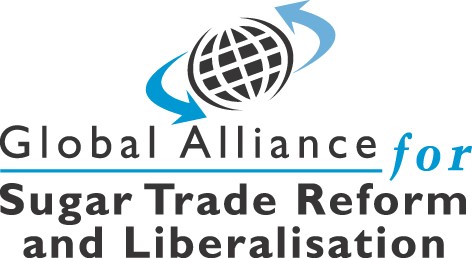 Global Sugar Alliance raises alarm as subsidised sugar exports start to flood world market
Global Sugar Alliance raises alarm as subsidised sugar exports start to flood world market
9 May 2018
Meeting in New York today the Global Sugar Alliance called on India, Pakistan and the European Union to abide by commitments they had made to end practices which distort the world sugar market.
The Alliance reminded the Pakistani and Indian governments to reconsider their use of artificial support mechanisms to export sugar, and to fully comply with their international commitments undertaken in the World Trade Organisation (WTO) and not export subsidised sugar.
“Fuelled by a glut of government supported sugar originating from Pakistan, and the threat of subsidised Indian sugar exports, the world sugar (ICE #11) has dropped 20 per cent so far in 2018 to a level not seen since the EU sugar export subsidy program was brought into alignment with its WTO obligations a decade ago”, said Global Sugar Alliance Secretary and CANEGROWERS Head of Economics Warren Males.
“Subsidised Pakistani sugar is already flowing onto the world market and significant volumes of subsidised Indian exports are expected to commence soon”, he said. This has driven the market to unsustainable levels, well below the costs of production for even the most efficient global raw sugar and sugarcane producers.”
Global Sugar Alliance Members are seeking a serious commitment from India and Pakistan to a major reform agenda over the medium to long term. Market distortions must cease; the government assistance provided to sugarcane and sugar productions sectors is detrimentally affecting the long-term viability and resilience of the domestic sugar industries in these countries.
The Global Sugar Alliance also called on the European Union to abide with its WTO commitments and eliminate the adverse effects of substantial sugar over-production and exports caused by its subsidy programmes.
EU sugar market reforms have failed to eliminate surplus sugar production that is being sustained by subsidies and protected by high import tariffs. This surplus is approaching the level that existed prior to the reforms. It is displacing imports of sugar into the EU market and, through substantially increased exports, depressing the world white premium.
“There must be no exports of the subsidised sugar”, said Eduardo de Sousa, Executive Director, UNICA. “The Global Sugar Alliance Members will be closely monitoring developments and encouraging our governments to take all necessary steps to ensure compliance with WTO rules.”
The degree to which current and proposed domestic support programs and export subsidies contravene WTO rules is currently a focus for trade lawyers.
The sugar market has long been plagued by distortive government interference. The Global Sugar Alliance has previously expressed concern about sugar subsidies.
Vibul Panitvong, Chairman of the Executive Board, Thai Sugar Millers Corporation said, “In the spirit of the decision taken at the Nairobi WTO Ministerial meeting to end export subsidies, Global Sugar Alliance members called on the Pakistani and Indian Prime Ministers to commitment unequivocally to the elimination of trade distorting government assistance.”
“Improved trading conditions are in everyone’s interests. Trade distorting subsidies must not be allowed to prevail,” said Sandra Marsden, President of the Canadian Sugar Institute.
About us
The Global Alliance for Sugar Trade Reform and Liberalization brings together 85% of the world cane sugar exports. The Global Sugar Alliance members (Australia, Brazil, Canada, Chile, Colombia, Guatemala, South Africa and Thailand) are active advocates to improve the world sugar trading environment. Members work closely together to ensure the fair and equal treatment of sugar and ethanol in the WTO negotiations on agriculture so that markets are allowed to work. We are working with our governments to remove restrictions that prevent consumers and sugar users, wherever they are located from accessing the most competitively produced sugar and ethanol in the world.
Background
Production and subsidies
Pakistan
- In 2016/17, Pakistan was the world’s eighth largest sugar consumer (5.5 mt demand/year) and the world’s seventh biggest sugar producer.
- Recent media reports suggest that Pakistan is set to produce 7.5 mt in 2017/18 (a 6 percent increase on 2016/17).
- The Pakistani government has adopted a number of measures such as guaranteed minimum prices for sugarcane, a sugar import tariff of 40 percent, subsidized transport costs and domestic freight, reduced export taxes, and a 2.3 mt export quota for 2017/18.
India
- In 2016/17, India was the world’s top sugar consumer (26.7 mt demand/year) and the world’s second biggest sugar producer after Brazil.
- Recent media reports suggest India is set to produce 31.5 mt of sugar in 2017/18 (a 55% increase on 2016/17).
- The Indian government recently mandated their sugar mills to export 2 mt of sugar, to lower inventories and to support local prices. The support package equates to approximately US$ 0.82 per tonne of cane or US$237 million on 280 million tonnes of cane.
European Union
- In 2016/17, the EU was the world’s second largest sugar consumer (18.5 mt demand/year) and the world’s third biggest sugar producer.
- The European Commission reports that the EU is set to produce 20.9 mt of sugar in 2017/18 (a 25% increase on 2016/17). In just one year, the EU has shifted from being a net importer to a net exporter of white sugar.
- The EU dismantled its domestic quota system in October 2017 but has maintained trade distorting domestic support in the form of direct payment subsidies.
